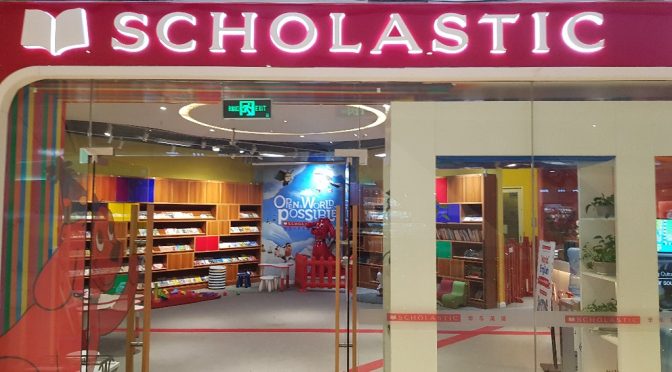You’re standing at the immigration desk as the official squints and winces at your passport photo. Are you who you say you are? What is your business in China?
You tell him you’re here to teach English.
Where?
This stumps you. You’ve certainly seen an address, kindly sent to you over WeChat by your school’s HR rep, but it’s all so alien to you that you don’t know what to say.
Scholastic?
He repeats the word in his Chinese way – with scepticism. You show him the address. His expression remains fixed.
He takes what seems hours scrutinising your passport and Z-visa. You look like a spy in your photo – turtlenecks, the most suspicious knitwear. Will they let you in? Are they about to cart you off to the gulag? Please god, no, what’s the Chinese word for gulag?
He hands you your passport back and waves you through. A search dog watches you as you leave the airport. You’ve already broken a sweat.
Outside, the heat hits you like opening an oven on full blast. You didn’t dress for the weather. Wool blazer – not the best choice in hindsight, but at least you look presentable.
Thankfully, you don’t have to navigate Wuhan’s concrete jungle with only your phrasebook and smartphone, which, thank you, Vodafone, is costing an extra £6 per day to use in China – hurry up and buy a sim card! Jasmine and Cody are there waiting outside.
Cody, a dark-haired American a little shorter than you, offers to take your suitcase. Jasmine, a dark-haired local a little shorter than Cody, asks you about your flight. Her English is almost flawless.
In truth, your flight was long and sweaty and instead of practicing your pitiful Mandarin like you’d planned to do, and unable to sleep, you’d spent the whole 11-hour journey from Manchester to Hong Kong watching Mean Girls and who knows how many episodes of Frasier, before transferring to mainland China.
Cody hails a taxi, which, at first, you mistake for a police cruiser, such is the impression given by the flashing lights on top – and you head off to your new apartment building. The journey is short but bumpy. You turn your head looking for what sounds like an ice cream truck. Cody points out the giant street cleaner before the taxi pulls up.
Conveniently, across the street sits Xintang Vanke, the mall wherein lies your new workplace. Jasmine’s pronunciation runs dangerously close to a dirty British word, but you keep this to yourself. Cody tells you that the Vanke Centre, one of upwards of fifty Scholastic English training schools throughout China, was the first of Wuhan’s three centres to have sprung up in the last few years. And, honestly, they’re glad you’re here. The three classes you’ll be taking over, one of which you’ll be teaching with Jasmine, have been left without a foreign teacher for several weeks.
The kids are already talking about you, Jasmine says, as you head up to your temporary room on the sixteenth floor. Pink unicorns and fluffy pillows abound. A beaded curtain parts into a cupboard-sized kitchen, but the air-con is a welcome relief from the heat.
A small green packet of Jissbon condoms is propped up triumphantly on the dressing table. They’re in the shops too, waiting at the cashier’s desk for all to see. The legacy of the one child policy. Everything out in the open. There are no secrets in China.
You make the mistake of opening the dresser drawer. You’re greeted by an array of furry handcuffs, leather blindfolds, muzzles, and a cat-o’-nine-tails. You don’t dare open the next drawer. You shut it and decide to call it a day.
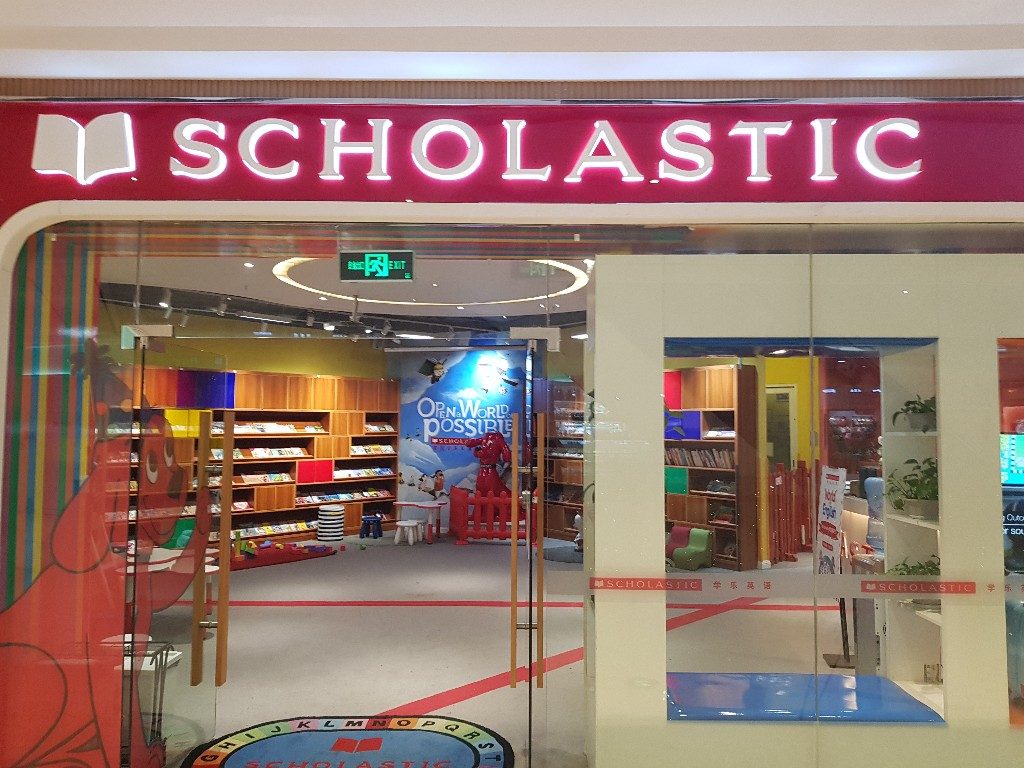
The Scholastic centre on the second floor of the Vanke Mall in Jianghan District is a cosy little unit with large floor-to-ceiling windows that allow parents and shoppers to peer into the sizeable demo classroom. Complete with smartboard and hanging stage lights, the room is funky and colourful. Cody points out the mall bathrooms just around the corner and warns you not to forget your tissues – toilet paper is non-existent in public spaces.
In the demo classroom, a class of ten nursery kids in red Scholastic polos laughs and cheers at the foreign teacher wearing a yellow hat shaped like a chicken. The local Chinese teacher films the skit on her phone. The local and foreign teachers support each other, Jasmine tells you, both sharing the workload, taking turns to lead the class using the Scholastic World of English program.
You enter the spacious library, bursting with Scholastic story books and guarded, like a dragon protecting its hoard, by a man-sized statue of Clifford the Big Red Dog. One of the centres, Cody tells you has its own Magic School Bus.
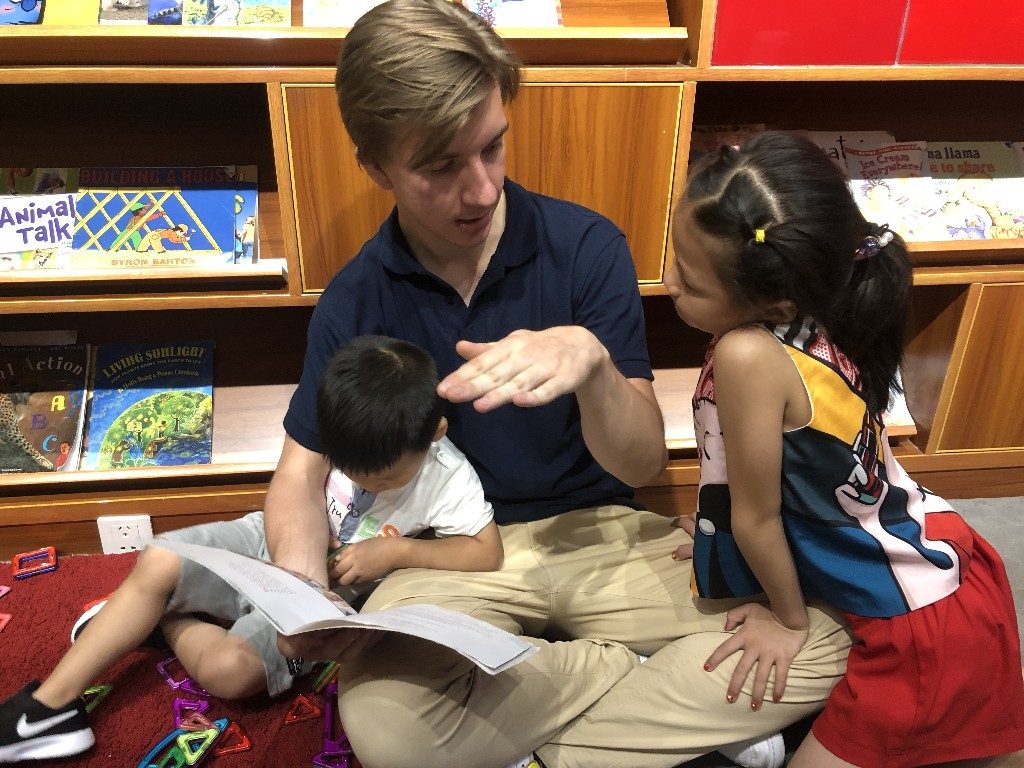
Your soon-to-be colleagues all greet you warmly as they pass by wearing their blue polos. One of the pink-shirted local administrative team hands you a grubby white shirt to call your own. Trainees wear white until after the initial probation period, Cody says, as you’re ushered into a closet-sized locker room-cum-changing area. The shirt smells a bit, but it’s yours.
Do you get a name badge?
Yes, you do! Someone slaps a red sticker bearing your name in black marker onto your chest. You feel less like a teacher and more like a student. You don’t have any teaching experience to speak of beyond your TEFL qualification, after all, and that was focussed primarily on teaching adults.
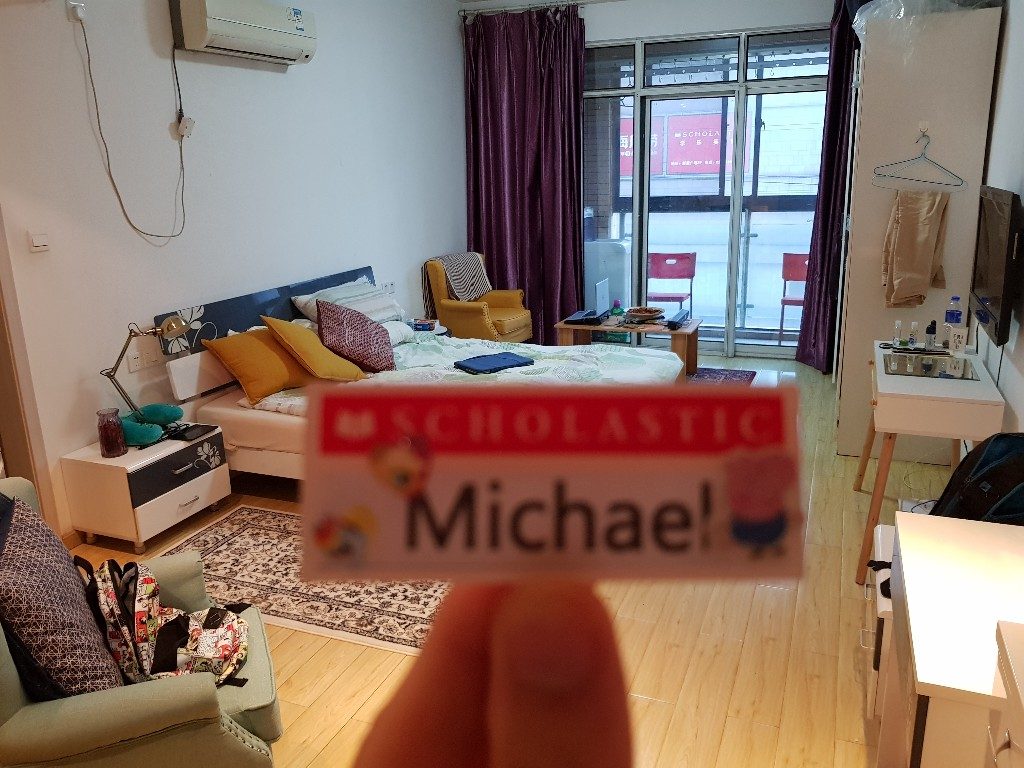
You sit down in the second of four classrooms beyond a little wooden gate and thumbprint scanner. Cody brings up a PowerPoint presentation and asks you what it requires to be a teacher. Patience, kindness, understanding – a strong immune system? All good answers. He tells you not to worry about your lack of experience – it’s a good thing. Starting from scratch means you can adapt to the Scholastic teaching procedures without any stubborn overhang from previous jobs.
Now, the big question: Why do you want to be a teacher?
You’re not prepared for this and you struggle to come up with an answer. You like working with kids? You want to inspire young minds? Share your love of English with the world? You don’t know. You can’t do this. Coming here was a mistake. Oh god what have you gone and done!
Now, says Cody, I’m gonna throw a lot of information at you, but I don’t expect you to remember it all. Everyone learns at their own pace – and, as we tell the kids – jiayou!
You ask him what it means. His face drops into a frown – his Chinese is worse than yours – and calls out to Jasmine in the next classroom. She pokes her head in and translates—
You can do it.
Yes. Yes you can.
And, now, here you are, three months in – twelve classes a week ranging from thirty minutes to two-and-a-half hours – your Chinese is coming along nicely, thanks to Rosetta Stone, and you’re learning new words every day. You did call a man’s child hen meiwei, which means delicious, and not beautiful as you had intended, but mistakes happen. The kids still laugh at your when you try to speak Chinese, and you know now that hu shuo ba dao is not appropriate classroom language.
The first month or so is tough – and boring. In order to take advantage of Alipay’s life-hacking convenience, be it using a public bike for a couple of hours, exploring the magical world of TaoBao, booking film tickets, ordering groceries straight to your door, or doing just about anything that doesn’t require stooping so low as to pay with cold hard cash, you first must have a bank account.
But, in order to get one, you first need a foreign residence permit, prior to which your school should have applied for your work permit (not the work permit they sent to you to have legalised months ago in the UK, but another one altogether). The wait is worth it. Now the world (or China at least) is at your fingertips.
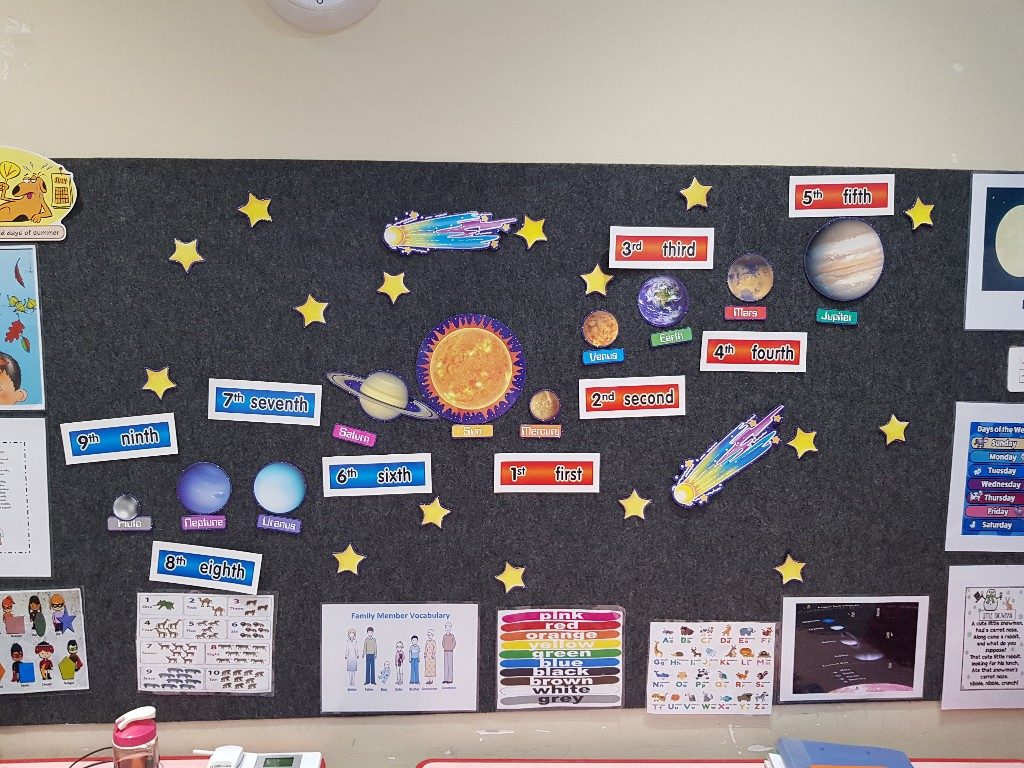
China is a strange country – a place of paradox. Walking down the street, you’ll be greeted by stench as foul as the food is appetising. While making great strides in technology and convenience, spitting in the street is commonplace, not at all frowned upon, and neither is letting your kids urinate in public, nor into a waste basket while you’re eating barbecued bullfrog in the middle of a crowded local dive restaurant. The occasional power and water shortages are a nuisance when they happen, but you’re in safe hands. China may be an acquired taste, but you’re getting used to it.
You’re glad you came to work for Scholastic. The holidays could be better, as they are at EF, but you’re pretty sure that recent drug bust in Wuhan involved a couple of EF-ers. Better to play it safe. Besides, you’ve two days off, late starts during the week, and a country with thousands of years of history to explore, whose language, though it may seem alien to you, has changed very little since the time of the Han Dynasty more than two-thousand years ago.
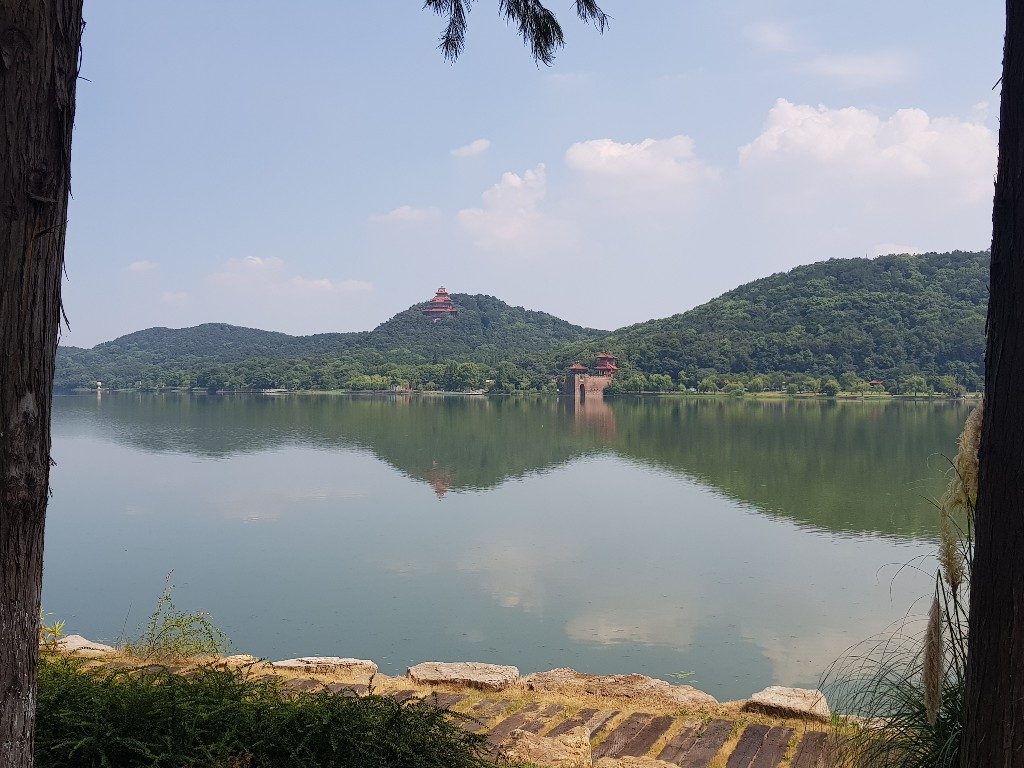
So, where to now? You’ve just been paid and there’s about 14,000RMB in your shiny new Bank of China account. Link it to your WeChat to view your balance with ease!
It’s all within your reach. From Wuhan, the Yangtze river flows east and west, with trains departing in all directions. And you could see yourself staying here for a very long time.

